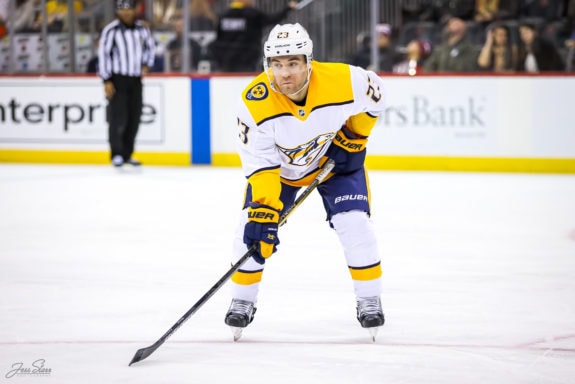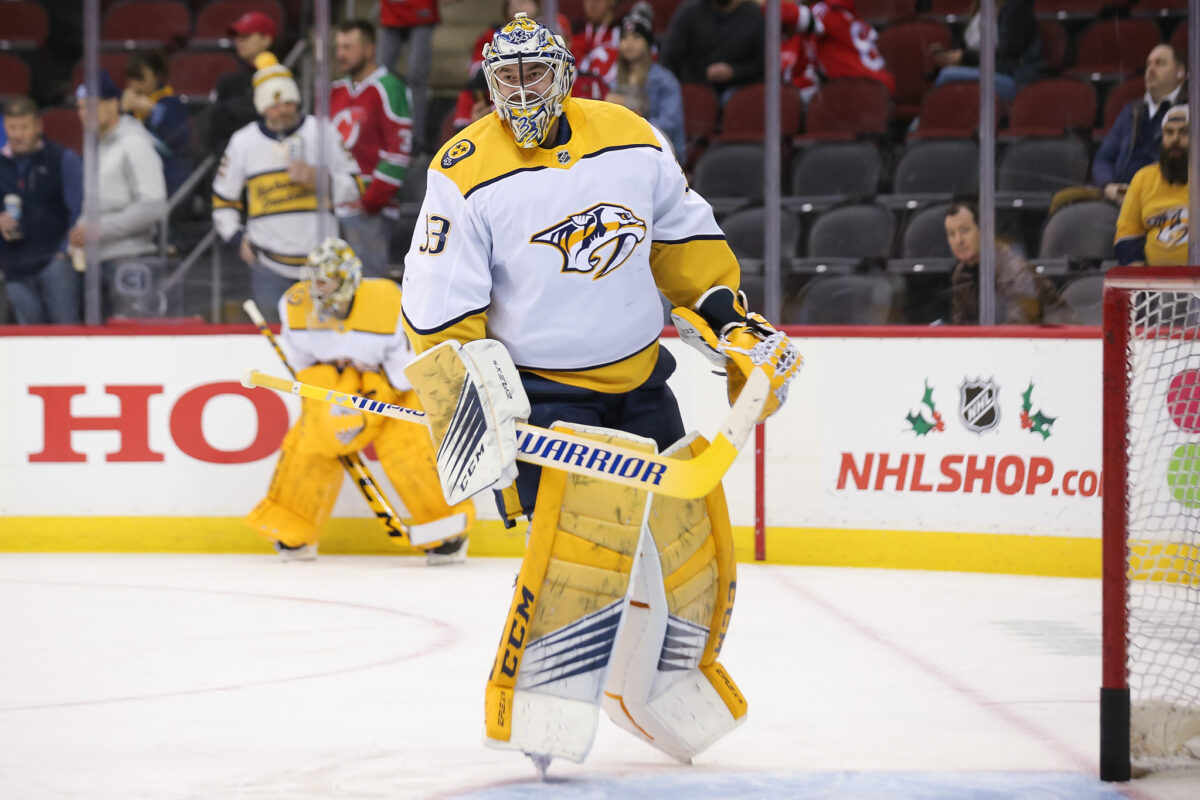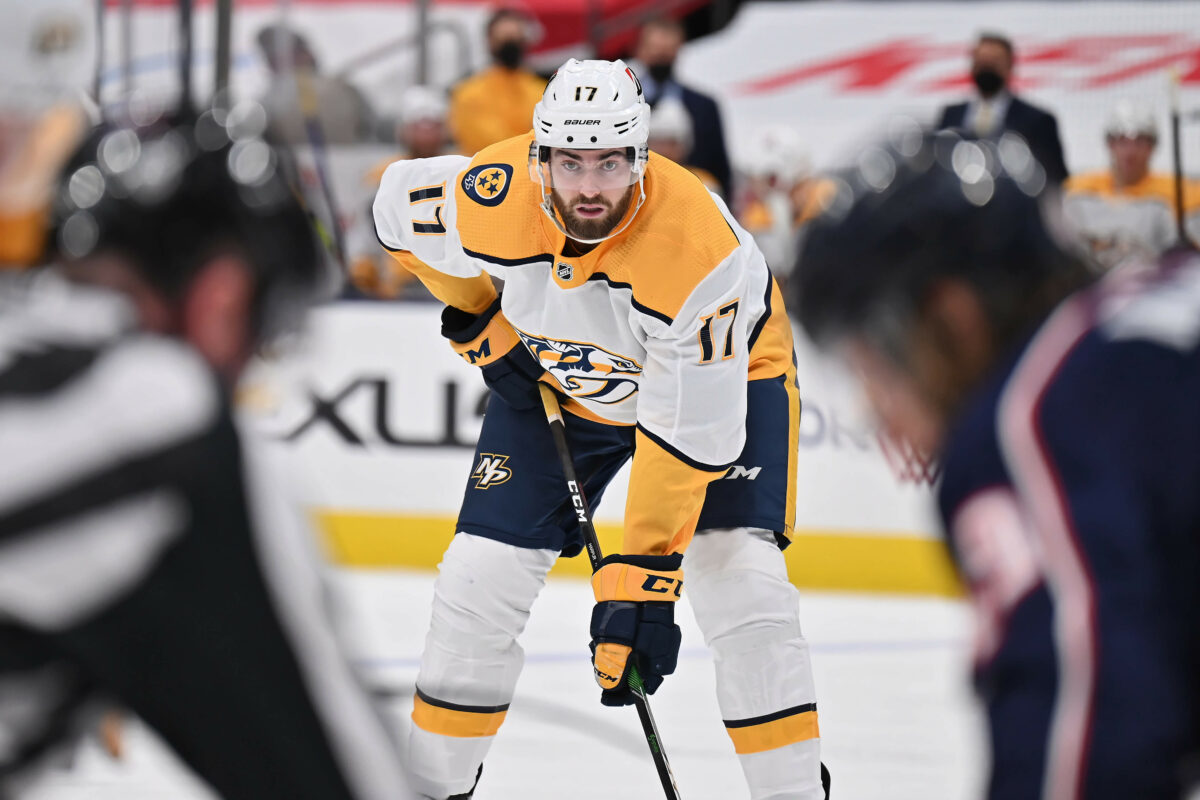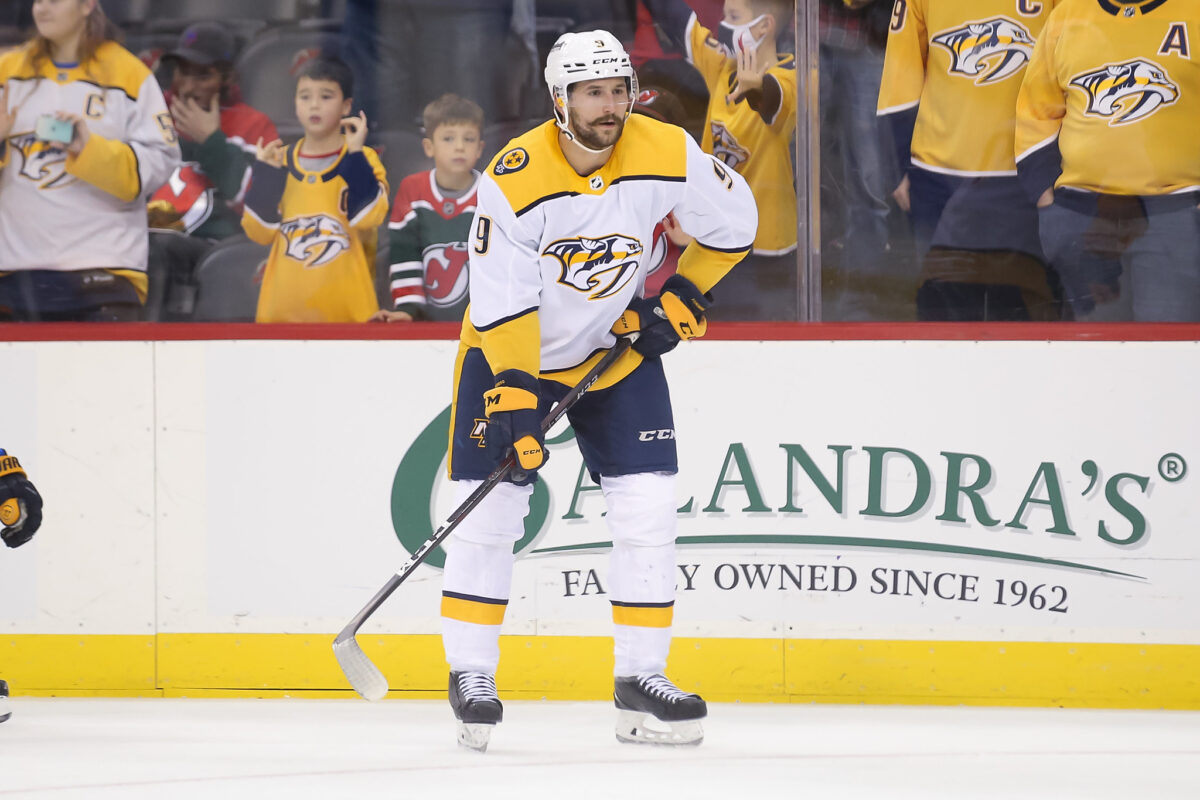The Nashville Predators managed to get red-hot right before COVID-19’s assault on the NHL took its toll, forcing the league to postpone games until after Christmas. The Predators now enter their holiday break on a seven-game winning streak and an 8-2-0 record in their last 10, propelling them into second place in the Central Division. With aspirations of another Stanley Cup Playoff appearance on the horizon, expect Nashville to be active buyers on the trade market to upgrade the roster before then. Here’s a look at five Predators players who are likely having their last run with the team.
Nick Cousins
A pending unrestricted free agent after this season, Cousins is unlikely to be re-signed given his role and limited playing time. The Belleville-native has appeared in 24 games this season, scoring just three goals and four assists. He last played on Dec. 12 before he was placed in COVID-19 protocol, logging 8:52 ice time and finishing with one shot on net and two hits. He’s a bottom-six player who can be replaced by a younger, cheaper alternative without having to give up too much grit in the process.
Cousins, 28, can still provide physicality to a lineup, playing an average of 13 minutes per game. Two of his three goals this season were scored on the power play, making him a solid secondary option for a team in need of a net-front presence. He doesn’t hesitate to get into the dirty areas and can cause a ruckus in the crease during and after a play.
Rocco Grimaldi
Grimaldi joined the Predators in 2018-19, and after two seasons with the club, management decided they liked what they saw and signed him for two more years. He had a career-best season of 10 goals and 21 assists in 66 games in 2019-20 and averaged under 13 minutes a game in that season and the next. But his feisty nature and hard-nosed style were very welcome in Nashville’s top-nine rotation.

Somewhere down the line, however, Grimaldi lost his place in the lineup. Emerging young talent could be one reason, with the development of Tanner Jeannot, Yakov Trenin, Luke Kunin, and Thomas Novak, but perhaps the breaking point was his lack of playing time. Grimaldi expressed his frustration which led to his demotion to the American Hockey League. The disconnect between him and management could result in Grimaldi’s departure from the organization this offseason.
While he was recalled just before the COVID-19 postponements kicked into full gear, it was clear his place was only temporary and not because the organization believed he could improve and match the same intensity we saw from him two years ago.
David Rittich
Signed in the offseason, Rittich came in with a $1.25 million cap hit to back up starter Juuse Saros and provide a handful of starts to lessen Saros’ workload. The belief was that Rittich could be the quality backup the team needed, but he has been anything but consistent. In four starts, Rittich’s record may look nice at 3-1-0, but his underlying numbers are concerning. His .880 save percentage and 3.10 goals-against average rank 71st and 51st, respectively, among goaltenders. His team has had to bail him out of most games and luckily enough, the Predators have been up to the task.

The market for goaltenders this offseason should be deep enough for the Predators to find a cheaper solution for the backup position. Rittich’s best days date back to his time with the Calgary Flames, and finding a better option may be the best move for Nashville.
Ben Harpur
Cheap and serviceable, Harpur as a depth defenseman in any organization isn’t a bad option, but with the emergence of Dante Fabbro and Alexandre Carrier, he has become expendable in Nashville. Last month, Harpur was assigned to the Milwaukee Admirals on a conditioning loan, but since then, he has been a healthy scratch in all but two games. The bruising defenseman has appeared in six games this season, averaging 12:28 of ice time. That’s considerably less than the 16-17 minutes he is used to seeing.

At 26, he could be a solid addition to a team in need of defensive depth or some physicality on their bottom pairing. In a limited role, Harpur can be an imposing figure who uses his size to kill off penalties – be it blocking shots or separating a player from the puck.
Filip Forsberg
This one hurts. But Forsberg is an unrestricted free agent after this season, and we haven’t heard of any contract talks. Of course, things can change at any point, and the desired conclusion is to see Forsberg sign a multi-year deal and remain with the club, but there’s a wave of uncertainty in the air.
With a $6 million cap hit, Forsberg is underpaid and due for a massive raise. The Predators have several restricted and unrestricted free agents coming off the books this offseason, giving them their current $14 million in cap space plus the money they will save by not re-signing some players.
Related: NHL Rumors: Maple Leafs, Canadiens, Sabres, Predators
As it stands, next season Nashville will have just over $20 million tied up in their forwards and a pinch over $21 million spread over their defensemen. Management will have to decide if they want to have three forwards making near-or-above 10% of the team’s salary cap. Some restructuring will need to take place as they try to upgrade throughout the lineup, so general manager David Poile will need to be careful with how he spends his cap space.

Forsberg, 27, has led the team’s forwards in points the last two seasons and has 22 points in 21 games this season. In a perfect world, he would continue to be an offensive juggernaut in Nashville, but can the Predators afford to have three forwards making $8 million? Additionally, on defense, they will pay Roman Josi over $9 million for the next six seasons, and given Mattias Ekholm‘s raise, which kicks in next season at $6.25 million, Poile could find himself in a tough spot. On the other hand, a sign-and-trade scenario could see them net a major return for Forsberg, which could help the team in the present and future.
The Predators don’t have many options if they want to keep Forsberg and prevent cap problems in the future unless they want to trade one of their $8 million players, Matt Duchene or Ryan Johansen, but they would not net a return even close to what Forsberg is worth on the trade market.
In Conclusion
Looking ahead to the 2022-23 season, Poile and the Predators will have just under $56 million tied into 25 contracts, 11 of which are roster players. With the cap going up by $1-million, this leaves the team with almost $27 million to re-sign their restricted free agents, mull over what to do with their unrestricted free agents, and then go shopping for some help. The determining factor could be what the Predators do in the post-season, as another early exit may result in a roster shake-up and a fresh outlook on mentality. This could mean saying goodbye to any (or all) of the aforementioned players. A deep run could bring forward a hybrid of both returning players and a re-tooling in a team structure. Only time will tell as the season continues in 2022 and how far Nashville pushes for their first franchise Stanley Cup.
